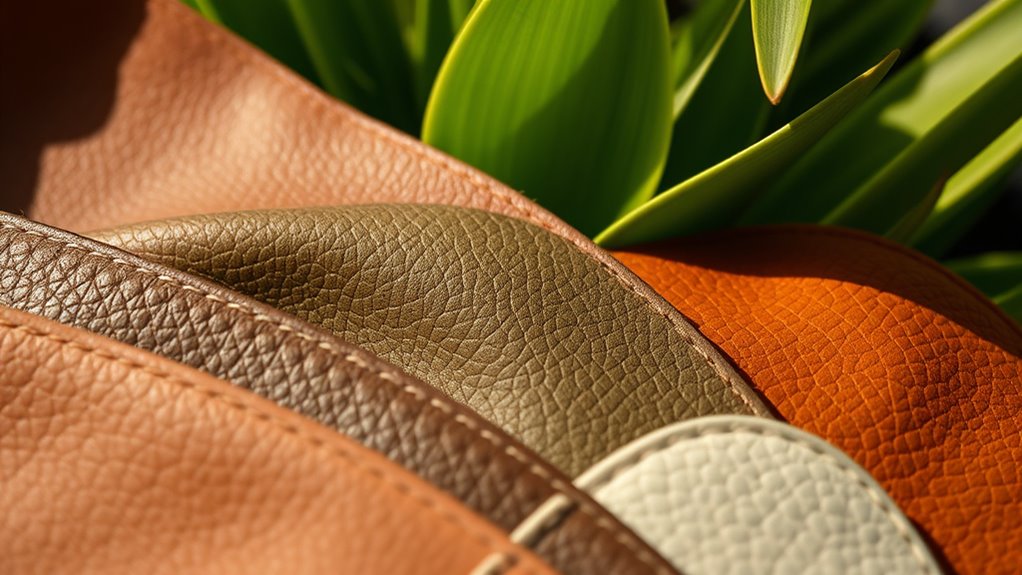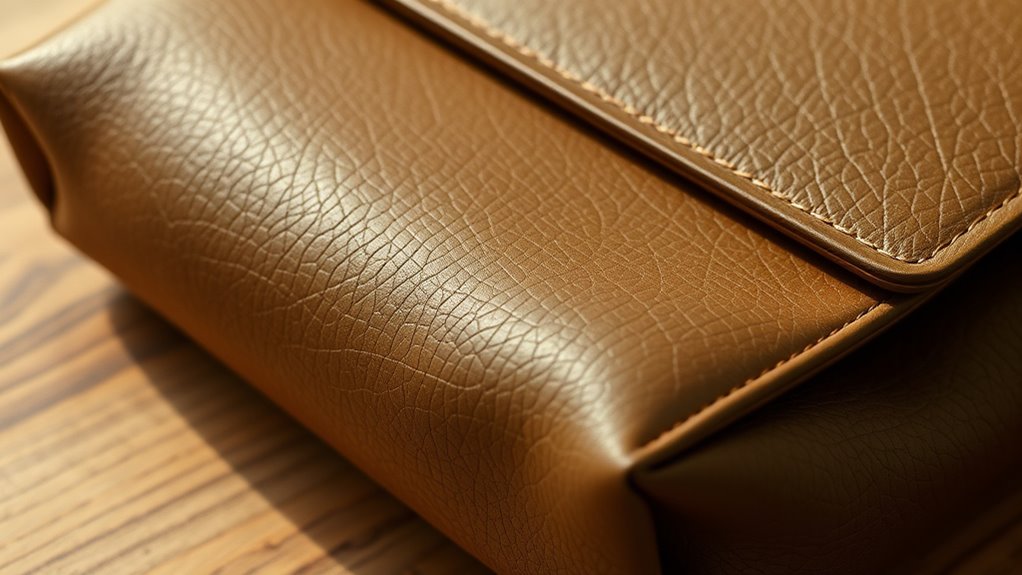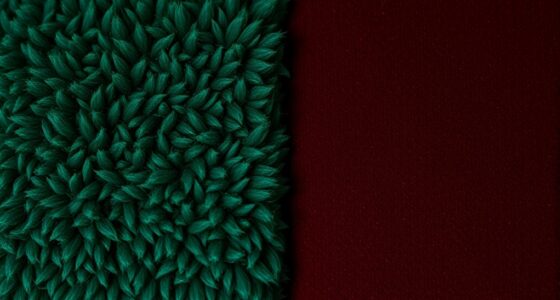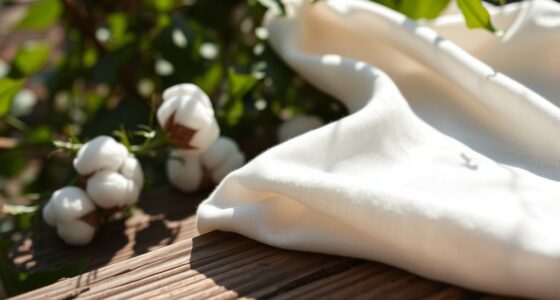Vegan leathers and plant-based options are eco-friendly alternatives you can choose instead of traditional leather. Made from materials like pineapple leaf fibers, cork, mushroom mycelium, or recycled agricultural waste, these options are sustainable and ethically sourced. They often mimic the look and feel of real leather while reducing environmental impact and avoiding animal harm. If you want to discover how these innovative materials are transforming fashion and accessories, there’s more to explore below.
Key Takeaways
- Vegan leathers are made from sustainable plant-based materials like pineapple leaves, apple peels, cork, and mushroom mycelium.
- Eco-friendly manufacturing processes minimize chemical use, water, and energy, reducing environmental impact.
- Plant-based options mimic traditional leather’s look, feel, and durability, suitable for fashion, accessories, and furniture.
- Supporting these alternatives promotes ethical, cruelty-free, and responsible industry practices.
- Consumers can choose high-quality, stylish, and eco-conscious products without sacrificing quality or design.

As more people seek sustainable and cruelty-free alternatives, vegan leathers and plant-based options have gained significant popularity. You’re increasingly looking for ways to reduce your environmental impact, and choosing materials that prioritize sustainable sourcing is a smart step. Vegan leathers are often crafted from alternative resources such as pineapple leaf fibers, apple peels, cork, or mushroom mycelium, all of which can be sourced responsibly without depleting natural ecosystems. This focus on sustainable sourcing means that these materials are produced with minimal harm to the planet, often utilizing agricultural waste or renewable resources, rather than relying on traditional animal hides that require extensive land, water, and chemical inputs.
Vegan leathers made from pineapple, apple peels, cork, and mushroom fibers are sustainable, eco-friendly alternatives to traditional animal hides.
When it comes to eco-friendly manufacturing, vegan leathers shine because they typically involve processes that are less polluting than conventional leather production. Many brands emphasize environmentally conscious methods, avoiding toxic chemicals like chromium tanning, which is common in traditional leather processing. Instead, they adopt innovative techniques that reduce water and energy consumption, making the entire process more eco-friendly. This shift not only benefits the environment but also results in products that are safer for you and the workers involved. You can feel good about choosing items that are manufactured with respect for the planet’s health, knowing that these materials often have a smaller carbon footprint.
Vegan leathers and plant-based options also tend to be more versatile and durable than you might think. Advances in material science have led to the development of products that can mimic the look and feel of traditional leather while maintaining their eco-friendly credentials. These alternatives are often lightweight, easy to care for, and resistant to cracking or peeling, making them practical choices for fashion, accessories, and furniture. *furthermore*, because they are free from animal products, they appeal to those who prioritize ethical considerations alongside sustainability.
Additionally, by opting for vegan leathers, you’re supporting a growing industry that values innovation and responsibility. Many brands are transparent about their sourcing and manufacturing practices, allowing you to make informed choices aligned with your values. As awareness around environmental issues continues to grow, so does the availability of high-quality, sustainable, and cruelty-free leather alternatives. This means you no longer have to compromise style or quality to make more ethical and environmentally conscious decisions. Instead, you can enjoy fashionable, durable products that reflect your commitment to a greener future.
Frequently Asked Questions
Are Vegan Leathers as Durable as Traditional Leather?
Vegan leathers aren’t quite as durable as traditional leather, but they’re improving in wear resistance. You might notice they can scratch or puncture more easily and may not age as gracefully. However, many high-quality options offer excellent durability and resistance to daily wear. If you want a sustainable choice, just keep in mind that the durability comparison favors real leather, though plant-based options are catching up with better wear resistance.
What Are the Environmental Impacts of Plant-Based Leather Production?
Did you know plant-based leather production reduces greenhouse gas emissions by up to 80% compared to traditional leather? You’ll find that its environmental impact is generally lower thanks to sustainable sourcing practices. However, it still requires significant water and energy, which can affect ecosystems. By choosing plant-based leather, you support eco-friendly options and help lessen your carbon footprint, making it a smarter, greener choice for the planet.
How Do Vegan Leathers Compare in Price to Genuine Leather?
Vegan leathers tend to be more affordable than genuine leather, making them an attractive choice if you’re budget-conscious. The cost comparison varies depending on the brand and material quality, but plant-based options generally cost less due to lower production expenses. Affordability factors include the type of vegan leather, manufacturing processes, and where you buy it. Overall, vegan leathers offer a cost-effective alternative without sacrificing style or durability.
Can Vegan Leathers Be Recycled or Composted?
Vegan leathers often can’t be recycled through standard processes because recycling facilities typically don’t handle their synthetic or plant-based materials well. Composting is also challenging due to added chemicals or non-biodegradable components. You might find some plant-based options that are compostable, but many vegan leathers require special recycling processes or end up in landfills. Always check product labels for specific disposal instructions to reduce environmental impact.
Are Vegan Leathers Suitable for All Types of Fashion Items?
Vegan leathers are quite versatile for many fashion items, but they might not suit every style or purpose. You’ll find them ideal for bags, shoes, and accessories, offering good fashion versatility and style compatibility. However, for high-end or specialized pieces, some vegan leathers may lack the durability or authentic feel needed. Always consider the specific qualities of the material to match your fashion goals and verify the right fit.
Conclusion
Choosing vegan leathers and plant-based options not only helps reduce animal suffering but also supports a more sustainable future. Did you know the fashion industry accounts for 10% of global carbon emissions? Every time you opt for cruelty-free materials, you’re making a difference—saving animals, cutting pollution, and embracing eco-friendly living. Your choices matter more than ever, so consider switching to these innovative, compassionate alternatives and help create a greener world for future generations.








